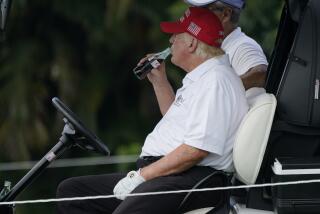One lung away from the presidency
- Share via
Every four years, the question arises: Is America ready for a [insert reductive noun here] in the White House? 2008 promises to be an especially rich year for such speculation, with candidates that include a woman, a Mormon, a Latino, a plagiarist, a bully, a hack, a romantic (actually, two) and, perhaps most frightening of all, a smoker.
Barack Obama would, of course, also happen to be the first black president, not counting Bill Clinton (and, since I’m not Toni Morrison, I don’t). But it would take nothing from his achievement to say that, if he wins, he will have done so as a smoker. Which is why it was a little disappointing to learn that he’s trying to quit.
There is no question that, for the sake of his own health and his family, he should quit. Nor is the argument that smoking is good for you, or that there is some value in having a smoker in the White House. Just ask Grover Cleveland. It is only to acknowledge that, on the scale of politicians’ imperfections, smoking ranks below other personal failings, such as drinking too much or being unfaithful.
Which should be obvious enough. But smoking is evenI use the word advisedlybetter than that: If politicians are going to have personal failings, and they are, then isn’t it better to have them in the open than sneaking around behind the building, cupping their personal failings in the palms of their hands? It’s harder to hide the smell of cigarettes than it is to hide, say, $90,000 in cash.
And for Obama, who if anything is seen as too perfect, too programmed or some combination thereofa charge his second book does little to dispelthen in smoking he has found the perfect vice. It’s visible. It’s unquestionably bad. No one will condemn him if he fails to control it. (Oh, some people might. But there’s no pleasing them anyway.) And if he does fail, the consequences for the republic are negligible.
Obama’s attempt to stop smoking, in fact, may be more problematic than his smoking. According to Jed Rose, a professor at Duke University Medical Center and an inventor of the nicotine patch, symptoms of nicotine withdrawal include “a decreased attention span and cognitive performance” as well as “difficulty concentrating and irritability.” For the most part, these are not helpful qualities in politics.
Obama was in Los Angeles yesterday for a rally and fundraiser, but I didn’t go to either event, so I can’t report how he feels. He is reportedly chewing Nicorette, which will please Rose. And the $1-million-plus he was expected to raise last night probably helped to make him slightly less irritable.
Still, he may be trying to do too much. Wouldn’t it be better to wait for the relative calm and quiet of the White House, or the comforting obscurity of the Senate, to fight his personal demons? Trying to quit smoking while running for president is a little like trying to remake the military while fighting a war.
But it’s hard to find anyone who doesn’t want Obama to quit. Not even David Sutton, a spokesman for Philip Morris USA, the nation’s largest tobacco company, is willing to say that he’d like to see a smoker in the White House. “I couldn’t comment about that,” he said. He was more interested in talking about QuitAssist, the company’s program to help smokers quit. “It’s part of our ongoing efforts to reduce the harm our products cause,” he said, in the kind of spontaneous admission that can only be the result of decades of litigation.
So I sent the Obama campaign the 48-page QuitAssist brochure. Don’t want to be accused of not doing my part. But if he asked me, I’d give him a light. Of Obama’s two current campaignschanging his habits and “changing our politics“I’m more interested in the latter.
Michael Newman is the deputy editorial page editor of the Los Angeles Times.
More to Read
A cure for the common opinion
Get thought-provoking perspectives with our weekly newsletter.
You may occasionally receive promotional content from the Los Angeles Times.




